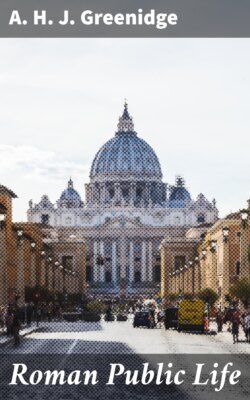Читать книгу Roman Public Life - A. H. J. Greenidge - Страница 3
На сайте Литреса книга снята с продажи.
PREFACE
ОглавлениеTable of Contents
The object of this work is to trace the growth of the Roman constitution, and to explain its working during the two phases of its maturity, the developed Republic and the Principate. The title selected perhaps expresses more succinctly than any other could do the nature of the plan which I wished to undertake. My desire was to touch, however briefly, on all the important aspects of public life, central, municipal, and provincial; and, thus, to exhibit the political genius of the Roman in connexion with all the chief problems of administration which it attempted to solve. This design, like many other comprehensive plans which have to be adapted to the limits of a single volume, was necessarily subjected to modifications in detail; and, since one of these modifications has affected the whole scope of the book, it requires some mention in a preface.
I had intended to carry the treatment of my subject beyond the confines of the Principate, and to describe the political organisation of the later Empire as elaborated by Diocletian and his successors. I found, however, that a discussion of this period would cause my work to exceed the reasonable limits which can be conceded to a handbook, and I was forced to abandon the enterprise much against my will. I was somewhat comforted in this surrender by the suggestion that the constitution of the later Empire was perhaps not strictly “Roman.” This is a verdict with which I agree in part. The organisation which had Constantinople as its centre was certainly the organisation of an Empire which was permeated with the social ideals of later Rome, which had adopted a Latin code, and which employed an administrative system whose origin was to be found in Italy; but in the forms of rule which the monarchy presented the break with the past was remarkable. The absolutism was no new thing, but the guise assumed by this absolutism was startlingly novel. It is not only that classic traditions were forgotten, that, as Gibbon says, “the purity of the Latin language was debased by adopting, in the intercourse of pride and flattery, a profusion of epithets, which Tully would have scarcely understood, and which Augustus would have rejected with indignation,” but that, even where the continuity in public institutions can be traced, it is one of names rather than of ideas. In the Principate we see a perverted Republic; in the monarchy a Res publica only in the narrowest etymological sense of those words. Perhaps the accession of Diocletian does, after all, mark the close of a true “Roman” public life.
The task, even as thus limited, has been a long one, and would have been still longer had it not been for the kindly assistance rendered me by a former pupil, Miss Muriel Clay, of Lady Margaret Hall. The help which she has given in the reading of the proofs, and in the verification of the references to original authorities, has not only facilitated the production of the book, but has materially improved it by the removal of errors and obscurities. I have also to thank her for the Index of subjects and the Index of Latin words which accompany the volume.
A. H. J. G.
Oxford, April 1901.
